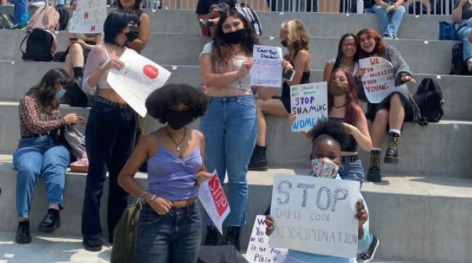Written by: Emma Pierce, Staff Writer
REFORM: Poly students demand dress code policy change through peaceful protest.
Under RUSD policy 5132, students “shall be dressed and groomed according to standards that will NOT substantially interfere with or detract from the school environment or disrupt the educational process”. These items include, but are not limited to, “Bare midriff or bathing suit tops, halter, strapless, backless or tube tops, see through clothing and tops with oversized neck and arm openings, low cut or revealing blouses or shirts, [and] clothing not sufficient to conceal undergarments or that is too revealing”. Dress code rules have sparked controversy this 2021-2022 school year as political and social expression becomes a consistent ambition of younger generations. Students have begun to take initiative towards joining broader public discourse regarding policies they believe are discriminatory.
The call to action began with anonymous flyers posted around campus, mainly girls’ bathrooms, heavily opposing what some believe is Poly’s “sexualizing” dress code. On August 23rd, a group of around 25 young women participated in acts of civil disobedience by wearing clothes prohibited by policy 5132 while carrying signs with phrases such as “STOP dress code discrimination” from class to class. Students organized the demonstration in order to voice that their “clothing choices shouldn’t affect students and teachers”, and how they “shouldn’t be sexualized as distractions just for wearing expressive clothing” (Kendra White, 11). Zoe Harris (11), another protestor, argues that contemporary style predominantly revolves around crop tops, which are easily accessible garments in fast fashion. She believes that a comfortable learning environment does not necessitate the regulation of urban clothing. Moreover, the exposure of a midriff, bust, or bare shoulders, “especially of a minor, should not be seen as distracting”.
Student activism towards internal affairs on campus or broader issues is an important characteristic of Poly’s current class, as social action on every level encourages a secure future for nearing generations. Kendra White (11), believes that internal campaigning in support of dress code reform may mobilize the involvement of other students or faculty and in due course, initiate an element of activism within Poly’s culture.

